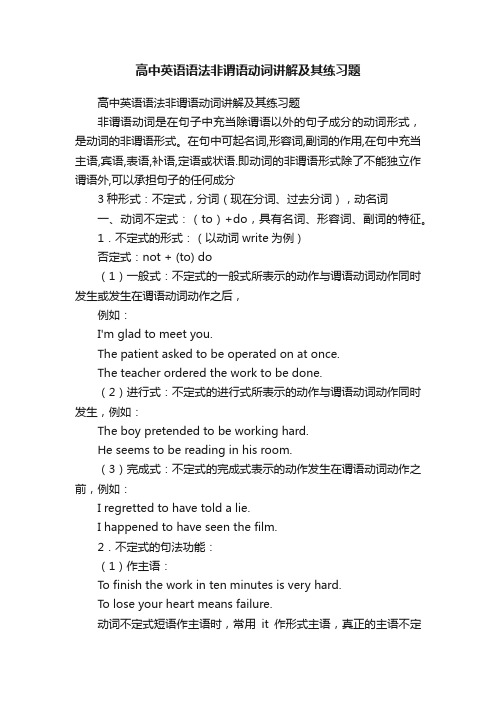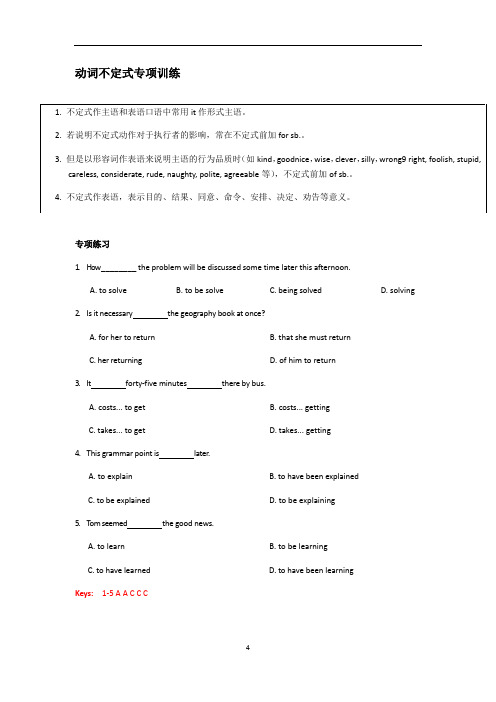高中英语语法非谓语动词之动词不定式讲解及习题
高中英语语法非谓语动词之动词不定式讲解及习题

高中英语语法非谓语动词之动词不定式讲解及习题动词不定式一.动词不定式的时态练习:1.I’m very happy (hear) that the German team won the match.2.She is said (study) in France.据说她正在法国留学。
3.He pretended (sleep) when his younger brother came in.当他弟弟进来时,他假装在睡觉。
4.When you called me up, I happened (prepare) dinner.你给我打电话时,我正好在做饭。
5.You are lucky (get)tickets to the football match.你买到了足球赛门票,真幸运。
6.He appears (wait) here for a long time.他似乎在这里等了很久。
(仍然在等待)单选1.We agreed here but so far she has not turned up yet.A.having metB. meetingC. to meetD. to have met2.Charles Babbage is generally considered the first computer.A.to inventB. inventingC. to have inventedD. having invented3.Tom happened when they spoke ill of him.A.passing byB. to be passing byC. to passing byD. to having passed by4.The doctor warned the patient not to eat sugar. I’m sorrytold you about it.A.to have notB. to not haveC. not to haveD. not having5.The crowd cheered wildly at the sight of Li Na, who was saida miracle in the tennis.A.makingB. having madeC. to have madeD. make6.The police are now searching for a woman who is reportedtosince the earthquake hit the area.A.have been missingB. missC. be missedD. have missed二.动词不定式的被动语态1.She asked (send) to work in Tibet.她要求被派到西藏去工作。
第11讲 非谓语动词:动词不定式(讲义)(学生版) 2025年高考英语一轮复习讲练测(新教材新高考)

第01讲动词不定式目录01 考情透视.目标导航 (2)02 知识导图.思维引航 (3)03 考点突破.考法探究 (3)【基础详单】 (3)知识点1 不定式的概念及特点 (4)知识点2 不定式的时态和语态 (4)考点一不定式的句法功能 (4)知识点1 作主语 (4)知识点2 作宾语 (5)知识点3 作补语 (6)知识点4 作表语 (7)知识点5 作定语 (8)知识点6 作状语 (9)考点二不定式的特殊用法 (11)知识点1 疑问词+不定式 (11)知识点2 不定式的省略 (12)知识点3 不定式的主动形式表示被动含义 (12)04 真题练习·命题洞现1.真题实战 (13)2.命题演练 (14)三年真题考点分布【基础详单】知识点1 不定式的概念及特点非谓语动词指不能单独作谓语,但保留动词的某些特征的动词形式。
包括动词不定式、动名词和分词(现在分词和过去分词)三类,它们没有人称和数的变化,但根据发生的时间、状态及主被动关系有形式上的变化,还可以有自己的宾语和状语。
动词不定式的基本构成形式:“to+动词原形”。
知识点2 不定式的时态和语态考点一不定式的句法功能知识点1 作主语【名师提醒】 1.不定式作主语时,相当于名词或代词,谓语动词用单数形式。
2. “赞扬,责备”的形容词通常用of sb作逻辑主语:wrong, right, kind, nice, brave, careful, careless, greedy, honest, lazy, modest, selfish, thoughtful, impolite, polite, clever, foolish, silly, stupid, cruel, rude, generous,considerable等。
3. 以下形容词通常用for sb作逻辑主语:easy, hard, difficult, important, necessary, impossible, possible, safe, dangerous, unusual, wonderful等用for sb作逻辑主语。
高中英语语法非谓语动词讲解及其练习题

高中英语语法非谓语动词讲解及其练习题高中英语语法非谓语动词讲解及其练习题非谓语动词是在句子中充当除谓语以外的句子成分的动词形式,是动词的非谓语形式。
在句中可起名词,形容词,副词的作用,在句中充当主语,宾语,表语,补语,定语或状语.即动词的非谓语形式除了不能独立作谓语外,可以承担句子的任何成分3种形式:不定式,分词(现在分词、过去分词),动名词一、动词不定式:(to)+do,具有名词、形容词、副词的特征。
1.不定式的形式:(以动词write为例)否定式:not + (to) do(1)一般式:不定式的一般式所表示的动作与谓语动词动作同时发生或发生在谓语动词动作之后,例如:I'm glad to meet you.The patient asked to be operated on at once.The teacher ordered the work to be done.(2)进行式:不定式的进行式所表示的动作与谓语动词动作同时发生,例如:The boy pretended to be working hard.He seems to be reading in his room.(3)完成式:不定式的完成式表示的动作发生在谓语动词动作之前,例如:I regretted to have told a lie.I happened to have seen the film.2.不定式的句法功能:(1)作主语:To finish the work in ten minutes is very hard.To lose your heart means failure.动词不定式短语作主语时,常用it作形式主语,真正的主语不定式置于句后,例如上面两句可用如下形式:It is very hard to finish the work in ten minutes.It means failure to lose your heart.常用句式有:1、It+be+名词+to do。
高中英语 动词不定式专项讲解及训练(有答案)

动词不定式专项训练A. to solveB. to be solveC. being solvedD. solvingA. for her to returnB. that she must returnC. her returningD. of him to returnA. costs... to getB. costs... gettingC. takes... to getD. takes... gettingA. to explainB. to have been explainedC. to be explainedD. to be explainingA. to learnB. to be learningC. to have learnedD. to have been learningKeys: 1-5 A A C C C专项练习1.The flu is believed_______ by viruses that like to reproduce in the cells inside the human nose and throat.A. causingB. being causedC. to be causedD. to have been caused2.There is a new problem involved in the popularity of private cars road conditions needA. that. .. to be improvedB. which ... to be improvedC. where. . . to be improvingD. when.. . improving3.Remember_________the magazine when you have finished reading it.A. putting backB. having put backC. to put backD. will put back4.—I'm sorry I forgot________ your dictionary.—Let's use Li Hua's.A. to takeB. takingC. to bringD. bringingA. to do whatB. what to doC. doing whatD. what doingA. writing... phoningB. to write. . . to phoneC. writing... to phoneD. to write. . . phoning7.Tom is always forgetting things he has done. Yesterday, he forgot and looked for it eve-rywhere.A. to post the letterB. to have the letter postedC. to having posted the letterD. having posted the letterA. to be notB. not to beC. not beingD. being not9.My brother regretted _______ a lecture given by Prof. Wang.A. missingB. to missC. missedD. being missing10.I regret _______ you that we are unable to offer you a job.A. informingB. having informedC. to informD. to informing11.He felt tired with typing the lecture. So he stopped_______ a short break.A. havingB. to haveC. takingD. to taking12.In order to gain a bigger share in the international market, many state-run companies arestriving their products more competitive.A. to makeB. makingC. to have madeD. having madeA. to sit... weptB. to sit. .. weepingC. sit... weptD. sat. . . weeping14.—You have come just in time tohelp us.—Fine. What needs________________________?A. I doB. doneC. to be doneD. to do15.That evening, he set about_________ t he report_______ the next morning.A. write... to hand inB. to write.. . handing inC. written... to hand inD. writing... to be handed in16.There seemed nothing ________ to do but ________ f or the doctor.A. leave... sendB. left... to sendC. left... sendD. leaving... send17.Do you think it difficult________ a dolphin ________ ?A. to train... jumpingB. training... for jumpingC. to train... jumpD. to train... to jump18.I prefer _______ rather than_______ .A. to do some reading... watching TVB. doing some reading... watching TVC. to do some reading... watch TVD. doing some reading... to watch TV19.The two boys pretended _________ v ery hard, though they did nothing.A. studyB. studyingC. to be studiedD. to be studying Keys: 1-5 CACCB6-10 CDBAC 11-15 BAB CD 16-19CDCD专项练习1.An army spokesman stressed that all the soldiers had been ordered clear warnings before firing any shots.A. to issueB. being issuedC. to have issuedD. to beissuedA. practise to singB. practise singingC. to practise to singD. to practise singing3.—What can we do to help Li Ming?A. making him to realizeB. making him realizeC. to make him realizeD. to make him to realizeA. disappearB. to disappearC. disappearingD. disappearedA. to writeB. writtenC. writeD. writingA. madeB. to makeC. makingD. to be makingA. saysB. sayingC. sayD. saidA. give upB. giving upC. to give upD. to giving upA. to commentB. commentC. to commentingD. being commentedA. reciteB. recitedC. recitingD. to reciteA. repeat the question againB. repeating the questionC. to repeating the questionD. to repeat the questionA. to be destroyedB. to have been destroyedC. to be destroyingD. to have been destroyingA. to go alongB. going alongC. went alongD. will goalongA. to get it to startB. get it startD. getting it startedC. to get it startedA. to sweepB. to be sweptC. should sweepD. being swept Keys:1-5 ADC AC6-10 CCCBA 11-15 DBACB1.—I'd like to buy a car made in Shanghai.—Okay, Sir. You have several models ________ .A. to chooseB. to be chosen fromC. to choose fromD. for choosing2.It's time________ rice.A. for transplantB. of transplantingC. to transplantD. to transplanting3.It is a very difficult problem. I need a few days_________ .A. of thinking over itB. to think it overC. of thinking it overD. to think over it4.People need homes _______ and food ________ .A. to live... to eatB. to live in... to eatC. live. . . to eatD. to live in... to eat for5.Columbus was the first _________ t he New Continent.A. to have discoveredB. to discoverC. discoveringD. having discovered Keys:1-5 CCBBB专项练习A. for the family to liveB. for the family to live inC. that the family can't live inD. that the family can't liveA. so everyone to understandB. for every one understoodC. for everyone to understandD. for understandingA. to get along withB. to get alongC. to be got along withD. to getting along withA. for us in followingB. for us to be followedC. to be followedD. for us to followA. to drink itB. to be drunkC. to drinkD. to be drinkingA. to seeB. for to seeC. for seeingD. seeing7. _______ , I don't want to argue with them about the matter.A. To tell you the truthB. Telling the truthC. Having told you the truthD. Out of the truthA. to not frightenB. so as not to frightenC. in order to not frightenD. for not frighteningA. showing me the wayB. as to show me the wayC. to show me the wayD. so you can show me the wayA. to leaveB. that he leavesC. as to leaveD. leavingKeys:1-5 BCADC6-10 AABCC专项练习vi. 不定式的时态与语态意义1. 不定式的时态意义1)一般式:不定式的动作与谓语动词的动作同时发生或是在其后发生。
高中语法非谓语动词之动词不定式讲解及练习

(7)动词不定式作独立成分 这些短语有: to begin with, to tell the truth,to make a long story short,so to speak,to be brief,to be frank,to conclude. 例:To begin with,I'like to introduce myself to you all.
2)在too...to结构中,后面的形容词是为 ready,eager,anxious,apt,willing,glad, pleased等词时,动词不定式不再有否定的意思。 too在此处可以理解成very的意思。 例:She is too ready to help. 她极其乐于帮助别人
原因状语: 动词不定式常跟在一些形容词后,说明产生这些情 绪的原因。这类形容词有: happy,surprised,sorry,glad,eager等 例:I am sorry to interrupt you.
2)be to 含有按计划,按命令做的事情或应该、可能、 注定发生的事情
例:We are to meet once a week. 我们按计划将一个月碰一次头。 What is to be done?应该怎么办? The key is nowhere to be found.可能
(4)动词不定式作宾语补足语或在被动语态中作主语补 足语 例:We'd love you to give us a hand. He was made to repair the broken chair. ※ 注意: 1)在一些动词后,作宾语补足语的动词不定式to要省 略掉。这类动词包括感官动词和使役动词。如: see,hear,watch,have,make,let等。但如果句子是被动语 态,动词不定式为主补时,要带to(let 除外) I heard her sing a song in the next room yesterday.
非谓语动词(动名词、动词不定式)总结及练习(附答案)

非谓语动词(动名词、动词不定式)总结及练习非谓语动词在句子中充当除了谓语....以外其它成份的动词形式,不受人称和数的限制。
在英语中,非谓语动词主要有动名词和动词不定式两种形式。
第一部分动名词1.0动名词是在动词后面+ ing (doing)的形式,把动词变成名词来使用。
比如:live → living, see → seeing, go → going,凡此种种。
2.0 动名词在句子中的成份2.1 动名词做主语e.g. Seeing is believing. seeing为动名词,在句子中做主语Learning Japanese is hard. 为动名词,在句子中做主语2.2 动名词作宾语, 此时多与一些固定的谓语动词作搭配, 见附表e.g. I like reading.He enjoyed living in France.2.3 动名词作介词的宾语,常常与类似如下短语的介词连用,如:dream of, keep awayfrom, be good at, be interested in …e.g. He is interested in drawing. 动名词drawing作in的宾语Please keep away from lying. 动名词lying作from的宾语2.4 动名词作表语e.g. Seeing is believing. 动名词believing作表语My hobby is skating. 动名词skating作表语2.5 动名词作定语, 对修饰的名词形成一种定义e.g. a dining room, a swimming pool, a waiting room…2.6 动名词作状语,逻辑主语须与主句主语报纸一致e.g. Hearing the good news, she couldn’t helping laughing. (时间状语)Having received the letter, I decided to write back. (时间状语)Having been to the Great Wall for many times, he didn’t go last week. (原因状语)Working hard, you will succeed.(条件状语)Though working hard from day to day, he didn’t get rich. (让步状语)2.7 动名词作宾语补足语,常与感官等动词连用e.g. I saw him leavingPlease keep him working.第二部分动词不定式1.0 动词不定式也是一种非谓语动词形式,其结构为“to+动词原形”,其中to不是介词而是动词不定式的符号,动词不定式没有人称和数的变化。
非谓语动词讲解和练习(附答案)

非谓语动词非谓语动词是英语语法中的一个重要概念,指的是在句子中不能单独作谓语,但又具有动词特征的动词形式。
一、种类非谓语动词主要包括三种形式:不定式(Infinitive)、动名词(Gerund)和分词(Participle)。
1.不定式基本形式是“to + 动词原形”(有时可省略to),例如“to study”、“to play”等。
它具有名词、形容词和副词的特征,可在句中充当主语、宾语、表语、定语、状语和补足语等成分。
To see is to believe.(作主语和表语)I want to learn English.(作宾语)2.动名词形式上是动词原形加-ing,和现在分词的形式一样,如“swimming”、“reading”等。
动名词在句中主要起名词的作用,可充当主语、宾语、表语和定语。
Swimming is my favorite sport.(作主语)I enjoy reading books.(作宾语)3.分词现在分词:也是动词原形加-ing,它既有动词特征,又有形容词和副词特征,可作定语、状语、表语和补足语。
The running boy is my brother.(作定语)Hearing the news, she couldn’t help crying.(作状语)过去分词:通常是动词原形加-ed(规则变化)或有其特殊的不规则变化形式,如“broken”、“written”等。
过去分词常表示被动或完成的意义,同样能充当定语、状语、表语和补足语等成分。
The broken cup is on the table.(作定语)Given more time, I can do it better.(作状语)二、用法区别1.作主语时不定式作主语常表示具体的某一次动作或行为,常用“It + be + 形容词+ (for/of sb.) + to do sth.”这样的结构,It is important for us to learn English well.动名词作主语往往表示抽象的、一般性的行为或概念。
动词不定式用法全解(含测试题及答案)

动词不定式用法全解英语动词的非谓语形式为三种:动词不定式、动名词和分词。
非谓语动词没有人称和数的变化。
动词不定式是一种非谓语动词形式,其结构为“to+动词原形”,其中to不是介词,而是动词不定式的符号,称为小品词,动词不定式没有人称和数的变化。
动词不定式和其后面的名词等构成不定式短语,在句子中可以用作主语、表语、宾语、补足语、定语、状语等。
动词不定式的形式:第一部分动词不定式的时态一、动词不定式的时态:动词不定式不能在句中作谓语,尽管它本身有时态的变化,但是却不能靠自身的变化形式表示动作发生的具体时间。
动词不定式发生的时间,一般只能根据谓语动词的时间,产生相对的先后时间关系。
1.不定式的一般式,表示不定式的动作与谓语动词动作几乎同时发生,或在谓语动作之后发生,或者不强调不定式动作的时间性。
但不定式表原因时,往往先于谓语动作之前发生。
如:The news will not fail to surprise him.这个消息将不会不使他大吃一惊的。
(不定式动作在将来和谓语动作同时发生)I helped to repair the car.我帮助修理汽车。
(不定式动作在过去与谓语动作同时发生)He didn't know where to go.他不知道该去哪儿。
(不定式稍晚于谓语动作)Tell your brother not to come tomorrow.告诉你哥哥明天不要来。
(不定式晚于谓语动作)判断:He decided to sell his car.I tried to go to school in time.I hope to see you soon不定式表示谓语动作的原因时,往往发生在谓语动作之前。
如:I am very happy to see you here.She seemed surprised to meet us.(先是遇见我们,她然后很吃惊)2.不定式的完成式,通常表示动作发生在谓语动词之前。
- 1、下载文档前请自行甄别文档内容的完整性,平台不提供额外的编辑、内容补充、找答案等附加服务。
- 2、"仅部分预览"的文档,不可在线预览部分如存在完整性等问题,可反馈申请退款(可完整预览的文档不适用该条件!)。
- 3、如文档侵犯您的权益,请联系客服反馈,我们会尽快为您处理(人工客服工作时间:9:00-18:30)。
非谓语动词讲解非谓语动词: a.动词不定式: 表示目的或未完成的动作,也可以修饰前面名词或代词b.动名词:修饰名词,表示它的性质,或放介词后面做宾语c.分词现在分词:表示和逻辑主语为主动关系,或表示动作的进行过去分词:表示和逻辑主语为被动关系,或表示已经动作已经完成)概述:1.谓语动词:在句子中担任谓语的动词2.非谓语动词:是动词的特殊形式,在句中可以作除谓语外的所有成分非谓语动词使用条件一个句子当中,已经存在一个主句(谓语动词),又没有连词的情况下, 还有别的动词出现时。
She got off the bus, leaving her handbag on her seat.She got off the bus, but left her handbag on her seat.动词不定式一.动词不定式的时态一般式进行式完成式完成进行式(not)to do (not) to be doing (not) to have done (not) to have beendoing动词不定式的动作与谓语动词的动作同时(或几乎同时)发生或发生在谓语动词动作之后谓语动词的动作发生时,动词不定式的动作正在发生动词不定式的动作发生在谓语动词动作或特定时间之前动词不定式的动作在谓语动词动作之前,且一直在持续练习:1.I’m very happy (hear) that the German team won the match.2.She is said (study) in France.据说她正在法国留学。
3.He pretended (sleep) when his younger brother came in.当他弟弟进来时,他假装在睡觉。
4.When you called me up, I happened (prepare) dinner.你给我打电话时,我正好在做饭。
5.You are lucky (get)tickets to the football match.你买到了足球赛门票,真幸运。
6.He appears (wait) here for a long time.他似乎在这里等了很久。
(仍然在等待)单选1.We agreed here but so far she has not turned up yet.A.having metB. meetingC. to meetD. to have met2.Charles Babbage is generally considered the first computer.A.to inventB. inventingC. to have inventedD. having invented3.Tom happened when they spoke ill of him.A.passing byB. to be passing byC. to passing byD. to having passed by4.The doctor warned the patient not to eat sugar. I’m sorrytold you about it.A.to have notB. to not haveC. not to haveD. not having5.The crowd cheered wildly at the sight of Li Na, who was saida miracle in the tennis.A.makingB. having madeC. to have madeD. make6.The police are now searching for a woman who is reported tosince the earthquake hit the area.A.have been missingB. missC. be missedD. have missed二.动词不定式的被动语态一般式完成式to be done to have been done不定式动作发生在谓语动作之后不定式动作发生在谓语动作之前或同时发生1.She asked (send) to work in Tibet.她要求被派到西藏去工作。
2.In general, people do not like (make fun of).一般说来,人们都不喜欢被他人取笑。
3.The book is said (translate) into more than 30 languages.据说这本书已被翻译成了30多种语言。
注意:动词不定式主动形式表示被动意义的常见情形1.名词/代词+ be + easy/ difficult/ fit + 动词不定式2.There be + 名词+ to do这周有很多家庭作业要做。
3.Sb have/ get/ want/ need + 宾语+ to do我有一些椅子要修。
4.give / show/ buy/ lend sb sth to doHe will show you the way to take. Please lend him some books to read.5.be to blame for The firm was to blame for the accident.单选1.The message is very important, so it is supposed out as soon as possible.A.to be sentB. to sendC. being sentD. sending2.Do let your mother know all the truth. She appearsEverything.A.to tellB. to be toldC. to be tellingD. to have been told3.When elephants eat huge quantities of leaves and grasses, other animals have trouble finding enough food .A.to be eatenB. eatingC. to eatD. being eaten4.In many people’s opinion, the CEO of the company, though relatively young, is pleasant .A.to deal withB. dealing withC. to be dealt withD. dealt with三.动词不定式作主语(1)不定式做主语时,可以直接放在谓语动词之前。
To see is to believe.Not to get there in time is your fault.(2)注:常用it做形式主语,将to do放在位于之后,使句子保持平衡。
句型1:It + 谓语+ to doIt takes us an hour _to__ get there by bus.句型2:It’s + n. + to do It’s our duty _to_ help the poor.It is a great enjoyment _to_ spend our holiday in the mountains.句型3:It is + adj + for sb to do sth(是形容事物的性质的)/ It is + adj + of sb to do sth(是形容人的品质的)It is easy for me to finish this work before ten. // It is a great honor for us to be present at your birthday party.It is very kind of you to give me some help. // It's impolite of you to speak to the teacher like that.练习:1.basic first-aid techniques will help you respond quickly to emergencies.A.KnownB. Having knownC. To knowD. Being known2.According to the doctor, would be good for you to have a holiday.A.thisB. thatC. oneD. it3.It’s standard practice for a company like this one a security officer.A.employedB. employingC. to employD. employs4.takes confidence to make a new start——there’s a dark period in-between where you’are neither one thing nor the other.A.ThatB. ThisC. OneD. It5.It took a long time for the connection between body temperature and illness .A.to makeB. to be madeC. makingD. being made四,动词不定式作宾语1.常见动词有:like, demand, expect, promise, begin, determine, refuse, offer, fail, manage, learn, seem, intend, forget, want, prepare, pretend, refuse, plan, afford, wish等They wanted _to get___( get ) on the bus, didn’t they?He said he wished __to be____( be ) a professor.2.it作形式宾语I find/feel to work with him interesting .I find/feel it interesting to work with him.3.Subject+ find/think/feel/make/ consider it+adj/n + to do sth.1)We thought _it__ better __to_ start early. .2)Do you consider _it__ better not _to_ go?3)I feel _it_ my duty _to_ change all that.4)We think _ it _ important _ to _ obey the law.4.常跟疑问词+不定式作宾语的动词: tell, advise, show, teach, find out, decide, discuss, learn, explain, know, discover, He taught us how to use the tool. //No one could tell me where to get the book //. I haven't decided whether to go or stay. 5.动词后接不定式和动名词的区别stop to do 停下来去做stop doing 停止做remember to do记得要做remember doing 记得做过forget to do 忘记要做forget doing忘记做过try to do企图做,尽力做try doing 试着做go on to do继续做(另一件事)go on doing 继续做(同一件事)regret to do遗憾要做regret doing后悔做过mean to do 打算做mean doing意味做1).In some parts of London, missing a bus means _A_ther hour. A .waiting B. to waiting C. wait D. to be waiting2).Boys, don't forget _D_ the windows before you leave the classroom. A. closing B. closed C. to closing D. to close3).She reached the top of the hill and stopped __C on a big rock. A. to have rested B. resting C. to rest D. rest4).Remember _A______ the lights when you leave the office.A. to turn offB. turning offC. turn offD. to turning off6.有些动词后接不定式和动名词作宾语时,意思差别不大,如like/ love / begin/ start/ prefer/ continue/ hate/ intend to do/ doing7.feel / find/ make/ think/ believe/ consider it + adj./ n. + 不定式8.advise/ decide/ discuss/ learn/ know/ show/ tell + 疑问词+不定式9.①介词but/ except/ besides + to do②介词but/ except/ besides 前面有实义动词do及其各种形式时,but/ except/ besides + do (to 省略)The young man had no choice but (go) abroad for further study at that time. What can Mary do besides (try) to sell her house?He used to do nothing but (lie) in bed, listening to the radio.She wants nothing but (drink) a cup of tea.单选1.David threatened his neighbour to the police if the damages were not paid.A.to be reportedB. reportingC. to reportD. having reported2.The citizens were told firecrakers after the Spring Festival.A.not set offB. don’t set offC. not setting offD. not to set off3.In the west, people make a rule to send Christmas presents to their relatives and friends.A.thisB. thatC. itD. one4.We feel our duty to make our country a better place.A.itB. thisC. thatD. one5.The two girls are so alike that strangers find difficult to tell one from the other.A.itB. themC. herD. that6.The teacher asked us so much noise.A.don’t makeB. not makeC. not makingD. not to make五.动词不定式定语1)不定式与它所修饰的词有动宾关系Do you have anything to wash today? //I want something to eat.2)不定式用来说明所修饰词的内容I have no chance to go there.3)The+序数词+(名词)+不定式She is always the last (person)to leave the room.4)不定式为不及物动词且和所修饰的名词是动宾关系时,须加介词1.The house is not big enough for us all___A____.A. to live inB. to be lived inC. to liveD. for living in2. Would you please pass me the knife ____A___?A. to cut the fruit withB. to cut the fruitC. cutting the fruitD. cutting the fruit with3.I have something important to say. Please find a piece of paper to write on (写上)4.Excuse me,could I use your pen for a moment?I have no pen to write with (写)单选1.My five-year plan is into different markets and open up an entity that focuses solely on nonprofit organisations.A.expandB. to expandC. to be expandingD. to have expanded2.There are still many problems before we are ready for a long stay on the Moon.A.solvingB. solvedC. being solvedD. to be solved3.That econimic boom led to Luanda being named the most expensive city in the world .A.to live inB. to liveC. livingD. living in4.——The last one pays the meal.——Agreed!A.arrivedB. arrivesC. to arriveD. arriving六.动词不定式作状语1.动词不定式作目的状语He drew a map to show us how to get to his house.To accomplish the task on time, we have to work day and night.为了加强语气,在动词不定式前面可以加in order/ so asHe ran very quickly so as to/ in order to catch the last bus.注意:so as to 引出的目的状语不能放在句首;in order to 引出的目的状语既可以放在句首也可以放在句子后部。
